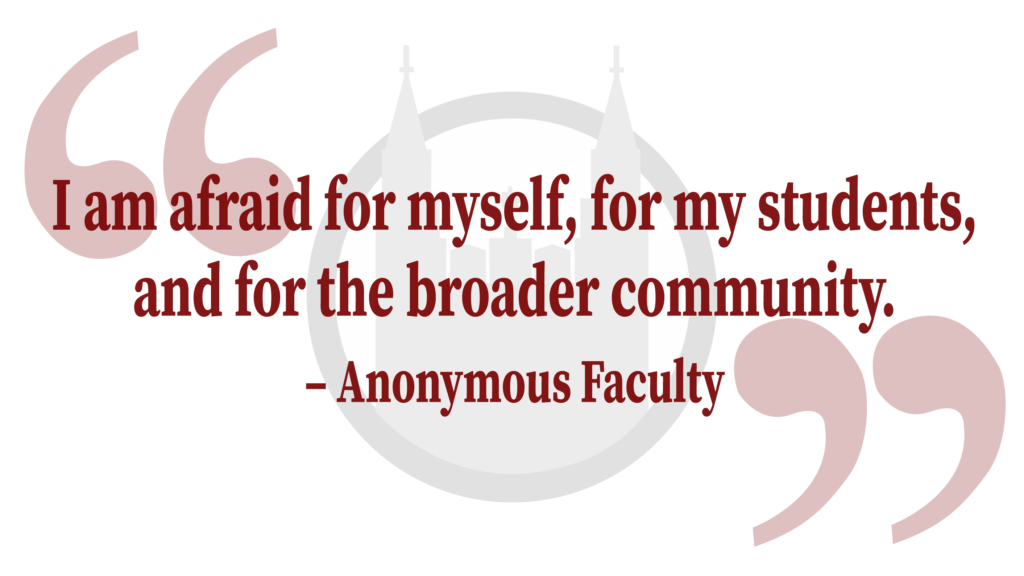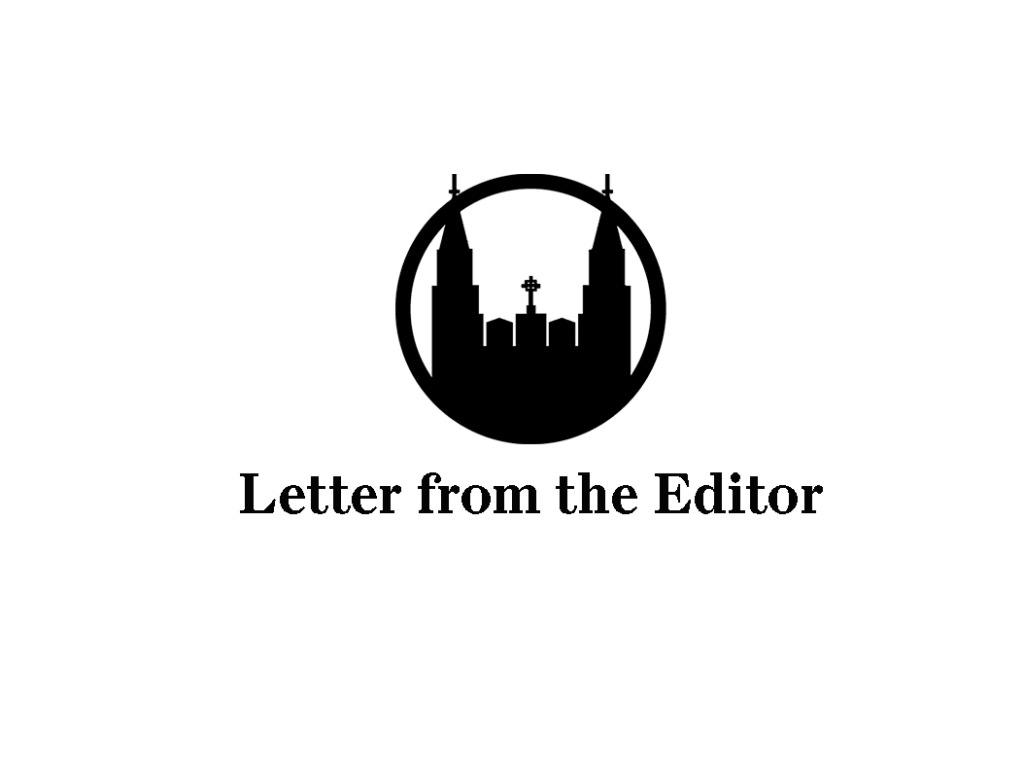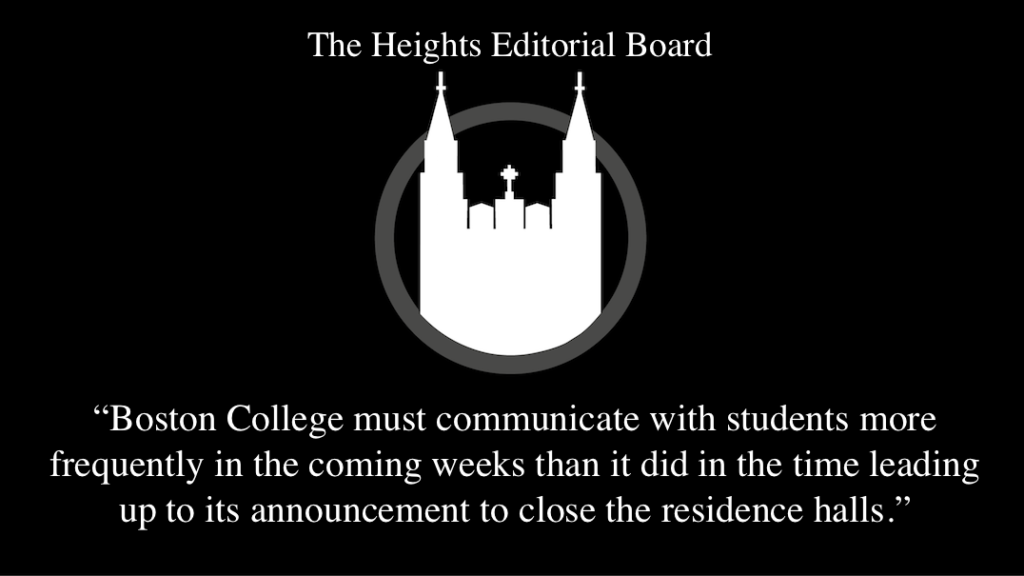The first time I visited Boston College, I hated it.
It was mid-August, and the campus was hot and empty. I stumped along in an adolescent funk, resolutely unimpressed by everything I saw. Gasson was still encircled by scaffolding, giving it a shabby appearance, and for some reason, the other academic buildings’ matching roof tiles deeply irked me. “It all looks the same,” I muttered darkly to my father, who was doing his best to pay polite attention to our tour guide. “I would never want to come here.”
Clearly, this initial sulky evaluation did not prevail, and nearly five years later—on the cusp of leaving—I’ve grown very fond of the school and campus alike. While I’m now willing to overlook the lack of architectural variation, though, my suspicion about BC’s penchant for exterior harmony has never quite gone away.
This uniformity isn’t merely aesthetic—although I’m still flabbergasted by how ruthlessly and regularly grass and flowers are ripped up and replanted. Despite our Jesuit credentials, the yen for unity isn’t quite religious, either—though the choice of an archbishop for our Commencement speaker, and an exit survey for seniors consisting mostly of questions about faith, suggests that someone up top thinks BC needs to double down on the Catholicism.
It’s more this vague ideological undercurrent, the notion that BC as an institution wholly embodies a particular ethic, a perfect catchphrase culture. You know—those little BC slogans that have become, if not cliche, then almost white noise. “Men and Women for Others” … “cura personalis” … “Ever to Excel” … “agape” … “Go Set the World Aflame.”
It’s nice to think that BC upholds those ideals consistently and that everyone is aligned with this sweeping, selfless vision—but that’s just not true. To cherry-pick examples: the president’s office remained silent last winter in the face of national anguish over the events in Ferguson, Staten Island, and Cleveland; students who had the guts to organize a nonviolent protest were rewarded with slaps on their wrists. The half-civil dance of futility between the administration and Climate Justice at BC continues, as does the (unfortunately) easily obfuscated issue of adjuncts’ rights. Campus is still not easily navigable for those with disabilities. GLBTQ representation is touch and go.
Even if you squint, it’s hard to see “Men and Women for Others” in all that. I’m sure there’s more, including a host of things I know nothing about. And to be fair, the students are hardly saints either. Over four years, I’ve borne witness to a healthy measure of racism, sexism, xenophobia, stupidity, pigheadedness, and apathy. (There’s also that room in Rubi that likes to blast Pitbull. You guys are the worst.)
So sometimes it’s hard to see much connection between those aforementioned catchphrases and the BC reality. But there really is something important at the core, despite the ways that we fall short: the implicit belief that each person has both the responsibility and the potential to make things in this life better for someone else. And that, for me at least, is the most important thing that has come from BC: being pushed, by the people I’ve met and the classes I’ve taken, to keep that worldview from contracting. To live constantly aware of the tension between the utter privilege of being here, and the fact that there is relentless need and suffering and strife everywhere—sometimes even right on campus.
In a way, yes, this awareness is something uniquely BC: a mindset encouraged, if not actually produced, by that Jesuit, social justice-y culture. But in the end, an institution—any institution—is an abstraction. The people who gather here are what make this place meaningful, even transformative.
When I look back at the past four years, the things that I remember best aren’t speeches or slogans—they’re these little blips of enlightenment or understanding. I can’t connect them to BC catchphrases, but I can trace each of them back to a specific moment, and to the people I was with. Reading Mrs. Dalloway in a windowless Stokes classroom. Walking in the Florida surf talking about God and love. Sitting in a tiny, makeshift home office on Foster St., grappling with the question: How best to serve others?
I would venture to guess that most members of the Class of 2015 have similar memories, in sentiment if not in kind: instants that stand out from the blur of reading and doing problem sets and writing papers and whatever happened on the weekends (no judgment, I promise). Those small, luminous moments with intelligent and empathetic individuals are the things that made BC, if not perfect, then worthwhile. And that’s where my faith lies as I get ready to leave this place: with the people I’ve come to know, funny and genuinely decent and so full of potential. (Possibly even you, Pitbull Room.)
It’s a little strange to be writing this summing-up sort of column now, when there’s still another week of class left, not to mention tests, papers, last-hurrah-type events. Time has a way of moving indecently fast when change is around the corner, though. Commencement Day will come and go quicker than you can say “Please have all your belongings moved out of your on-campus residence by 8 p.m.” So I do want to say, when I have the chance, that I’m extraordinarily excited to see what becomes of this ragtag bunch after graduation—where we go, what we do for the world. I hope we never stop asking more of ourselves. More kindness. Deeper thought. A greater willingness to brave discomfort.
I hope, too, that those who remain at BC ask the same of themselves, each other, and this institution. I’m unspeakably grateful for my time here, I really am, but gratitude doesn’t entail turning a blind eye to shortcomings. And love, I think, demands the highest standards.
So for those who are leaving, and for those who stay: Come on, BC. Ever to Excel.
(And thank you.)
Featured Image by Margaux Eckert / Heights Senior Staff


















